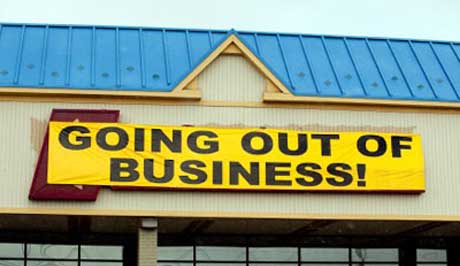Business Gone Bad

Todd: So Kevin, you were saying that you've been poor, broke, a couple of times. You talked about being in New York, and being broke. When else have you been broke?
Kevin: Wow. Well, after New York, the following year, when I came down from New York, I was determined to be my own boss. I had not been in control of my life while I was in New York. It was all depending on other people to let me have a job. And when I lost the job, that really, that really hurt.
And so when I went home I decided that I was going to own my own business, and I opened my first business which was a Karate school, and I put a lot of money into it that I had worked for almost a year saving up and then, well I also had a small inheritance from my grandmother.
Todd: Oh okay.
Kevin: Yeah. But I ended up losing all of the money in the Karate school.
Todd: Now did you actually know Karate?
Kevin: Yes.
Todd: Oh you do?
Kevin: I do.
Todd: I did not know that about you.
Kevin: That would have been a strange business to start if I didn't know it. But yeah, yeah, I'd done it, I started when I was a kid. And, at the time, I was 20, I think 20, just about to turn 21 when I opened it. And I was ni-dan at the time, second degree black belt, and I had been teaching at my instructor's school for a while and he had encouraged me, you know, to go ahead and do it. But it was the wrong location, and the wrong town, the town was really poor. And I lost about $20,000 in 6 months.
Todd: That's a lot of money.
Kevin: That is a lot of money. Especially to a 21 year old who, you know...
Todd: Yeah, $20,000 when you're 21, you can live for like 3 years.
Kevin: Right, and not a year and half earlier I was flat busted broke in New York, and then, you know, things picked up and I thought that I could really try and make something of it. But you know, nothing ventured, nothing gained, and that was the attitude that I had, and, you know, found myself broke again.
Todd: So that fact that you've been poor, but you were poor both times when you were very young, do you look back and are you glad that you had those experiences?
Kevin: Sure. Sure, I learned a lot. Those experiences were valuable. You can't buy that kind of experience, you know, I carry it around with me now. I listen to other people who have business ideas and, you know, one thing that I gained from it is I can tell if they are going into a business, if they're gonna try and start up a business and, you know, they haven't considered all the things that they really need to consider, I can see the pitfalls that I fell in. And, you can try and suggest people to, you know, make other arrangements or to be more careful about this or that, but it doesn't always work out. Sometimes they just have to go out and learn the hard way like I did.
in control of

I was not in control of my life while I was in New York.
When you are in control of something, that means you make the decisions and choices about it. If you are not in control of something, that means things happen and you cannot stop them or prevent them. See the following sentences:
- A good teacher is always in control of the class.
- People addicted to drugs are not in control of their lives.
inheritance

I got a small inheritance from my grandmother.
An inheritance is something you receive after someone dies or leaves. Usually, an inheritance is money or property. See the following examples:
- His father died and left him a million-dollar inheritance.
- We inherited the old problems from the previous manager.
flat busted

I was flat busted broke in New York.
When you are flat busted, that means you are completely poor, and that you have lost all your money. You have no money and no savings. You have busted, or broken, your bank. Notice the following sample sentences.
- I was flat busted after the fire burned my house.
- The company is flat busted. It can't even pay its workers.
picked up (to pick up)

After awhile, business picked up.
When things pick up, that means they get better. In business English, this means business gets better and sales improve. Notice the following:
- Sales usually pick up around the holidays.
- If things don't pick up soon, we will have to reduce the staff.
nothing ventured, nothing gained

Rule of life: nothing ventured, nothing gained.
This phrase means that if you don't try something, you can't achieve anything. To venture is to try to do something. We often use the phrase to encourage people when they are shy to start something. Notice the following conversations.
Bob: I'm afraid to start my own business. It could be risky.
Sue: Nothing ventured, nothing gained.Joe: I want to ask Mary out, but I'm afraid she will say no.
Ann: Nothing ventured, nothing gained.
the pitfalls

I can now see the pitfalls I fell in.
A pitfall is a danger you cannot see. It refers to a pit, or whole, in the ground. As you walk, you do not see it, but if you go to step in it, you fall down. In life, we have pitfalls in many situations: love, school, sports, work, and so. Notice the sample sentences.
- One pitfall for the failing restaurant was hiring young staff.
- The biggest pitfall for new businesses is unexpected costs.
work out

Things don't always work out.
When something does not work out, that means it stops or ends. If something does work out, then it continues to go on. See the sample sentences.
- My last job did not work out. It was boring so I quit.
- I really like my new boyfriend. I hope things work out for us.
learn the hard way

You have to learn the hard way like I did.
To learn the hard way is to learn by failure. When you fail, you learn from your mistakes and you do not do them again, so we call that learning the hard way. Here are some sample sentences:
- Most teachers learn the hard way that you sometimes have to be strict with students in class.
- I learned the hard way that gambling is a bad habit. I lost a lot of money.
Vocabulary Quiz
flat busted • inheritance



















